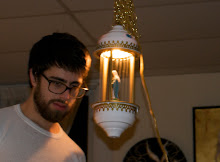Dear Church of the Holy Abstraction:
At the risk of slicing down whatever cred you/I think I have, I was thinking about this line from the Bush song, "Greedy Fly":
We are servants to our formulaic ways.
OK: so Gavin Rossdale is no Alain de Botton.
It's that our that gets me: we create formulas, and then we not only follow them, we serve them, and not necessarily in the redemptive way you might use that word in a sermon. In fact, a formula is something through which to devise any system of consistent results--meaning, a blueprint for making habits of things. I have a formula for tea and coffee. For brushing my teeth before breakfast. For running twenty minutes before lunch because I've convinced myself it burns more carbs then running after lunch. The thing is, I hate running, and for the sake of my stomach, caffeine shouldn't be a daily thing. But I need these repetitive actions to help me navigate the new territory I embark on everyday.
I know what you're thinking: "This is why we have to be careful what we serve. Thou wouldn't want any false gods, wouldn't thou?"
Well, no.
It's that kind of one-plus-one analogizing that makes many of your homilies too much on the repetitive end, and not enough toward the unexplored. Christ's daily ritual was to not have a place to lay his head--his morning coffee was to wake up and move to the new.
You have formulas inside your walls. A lot of you put on holy airs and call it liturgy, your eyebrows lifting on the lit, your lips pursing solemnly to let us know how sacred it is. But liturgy is mundane, quotidian, daily, routine, habitual, formulaic. And that's not a condemnation: we need the mundane desperately.
However, we'd be fine if tomorrow we lost every inky drop of liturgy, each suppliant letter of printed "common" prayers (common, meaning that a certain action repeats itself), and all the resounding gongs of commentary.
It would not be anarchy, and we would not have lost revelation. We would start writing just as deeply, succinctly, mysteriously as anyone from Hippo or a desert cave could. After all: We are servants to our liturgical ways. My fear is that not everyone would accept this passing. Many would dedicate their lives in search of lost liturgy, of habits with unknown origins. And in so doing, church would become an homage to the idea of church.
I am a memoirist, an archivist by nature. The past, too, can be new territory. But, remember that it is populated by the shadows of ghosts, a mythic armature dripping with a smoky liquor that will turn you into a cloud--that is, the illusion of being.
Waiting, Always,
a sleeper


No comments:
Post a Comment